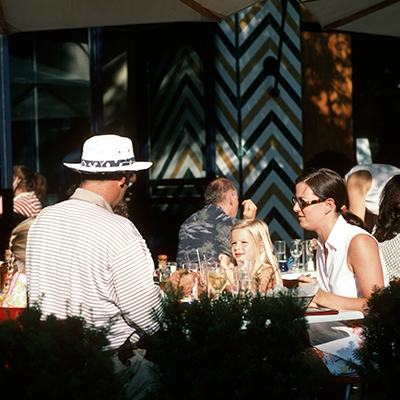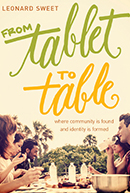
“The table is not just a place for food,” says Leonard Sweet, “but a place for stories and ideas to mingle, interact, attract each other, argue with one another, and procreate.” (Image: http://bit.ly/185JbvT)
Americans today work longer hours than at anytime on record, and we work more on average than any other place in the industrialized world. Add to this soccer practices, social events, routine errands, and religious services, and one might ask, “Who has time for a sit down meal anymore?”
But such behavioral patterns may be robbing us of spiritual vitality, says theologian and author Leonard Sweet. In his book, “From Tablet to Table,” he argues that meal-sharing is central to the story of God found in the Bible and critical to a healthy communal life. Sweet’s advice is practical–he suggests substituting “family breakfast” for dinner–and his words are provocative–he calls the table a bed “where ideas have sex”. Here we discuss the importance of the table and how he believes we can rediscover its benefit.
RNS: Some might say that eating a meal is just a necessary part of survival, nothing more. How does sitting at a table connect us to God’s story?
LS: The lure of a pot of beans and bread is why Jews became descendants of Jacob rather than Esau. “Eat freely” are the first words out of God’s mouth in our oldest creation account (Genesis 2), and food rituals are key to what it means to be a Jew, as well as what it means to be a human. The Jesus story begins with a table in a city whose name means “House of Bread.” There is a table in the stable, for the Savior’s manger-crib was nothing but a food trough for animals. And the table is the primary metaphor for Jesus’ relational and communal feast of salvation.
The best way to look at the Bible is not as a tablet of ink but as a table of food.
RNS: And the table is a more special place to learn the Jesus stories in your view?
LS: The notion of eating as merely for survival is a modern contrivance, evidence of how far we’ve fallen. One of the things that distinguishes humans from animals is their tendency to enjoy their meal, not just endure it. But the table is also where we have”messiah moments.”
What has been the most important act of worship in church history? Gathering at the table and singing, which have always gone together in some way. Sharing the bread and cup and singing the story are table features of the first “Lord’s Supper.” And cognitive science reveals that what you learn by singing gets more deeply embedded than anything else. That’s what makes singing so dangerous, so revolutionary … things get stuck in the soul that never come out, both good things and bad things.
RNS: Does the kind of food one enjoys at the table make a difference?
LS: Consider Melanie Dunea, a young photographer with a global eye who had an idea that has taken on a life of its own. She wondered how the best chefs in the world would respond to three questions: What would be your last meal on earth? Where would you like it to be? Who would you like to eat it with? “My Last Supper” is now its own brand with multiple books and a website.
Most of these world-class chefs chose as their last meal a menu not primarily based on the food itself, or their favorite recipe, but who they wanted to eat it with and where they wanted to eat it. In other words, relationships with people and place trumped the food itself. Some chefs even chose their last meal menu, not because they liked what was on it, but because their dining companions would like it.
RNS: Many families are so busy that they have little time for family meals. Does this make them somehow less “Christian”?
LS: There were many nights when the Sweet family didn’t eat supper until 8 or 9pm, depending on when basketball practice ended or work-schedule permitted. A family breakfast is a good alternative to family dinner. It just takes everyone getting up and showered a half-hour or so earlier.
There aren’t degrees of Christian faith and practice, but there are implications to following Jesus that we must take seriously. One of those is active resistance against a dehumanizing slide, where we sacrifice our table time in idolatrous worship of the busy schedule. What’s the mortar to build individuals into a family? The grout of grace that is ladled out at mealtime.
RNS: What about those who enjoy the table a bit too much? There is a national obesity epidemic in America. Shouldn’t some people stay away from the feasting table despite its supposed spiritual benefits?
LS: Jesus was a walker. It was not unusual for Jesus to walk 20-30 miles in a single day. If people are walking that much, you can understand why food looms large in any reading of the gospels. We need to either physically exercise more, or exercise more self-discipline. My personal motto is: Everything in moderation, including moderation. Festival tables like Thanksgiving and Christmas are when I go moderate about moderation.
But the table is not just a place for food, but a place for stories and ideas to mingle, interact, attract each other, argue with one another, and procreate. You might even say the table is the bed where creativity is conceived, where ideas have sex. People do not need more information. People are hungry for real food—-relationships, stories, songs, bonds, identity. It’s time to bring back the table, in our homes, in our neighborhoods, in our churches, in our world.
http://vimeo.com/115984656







